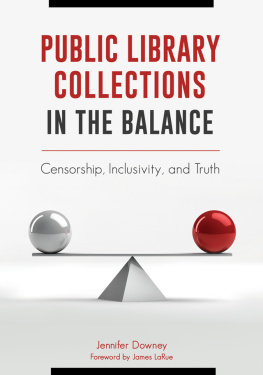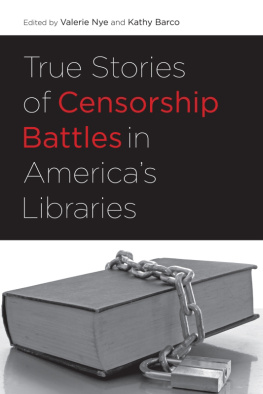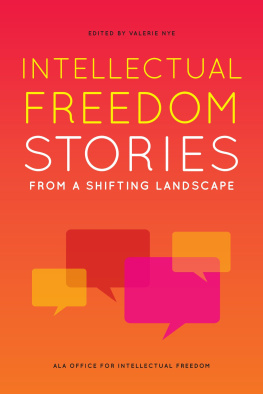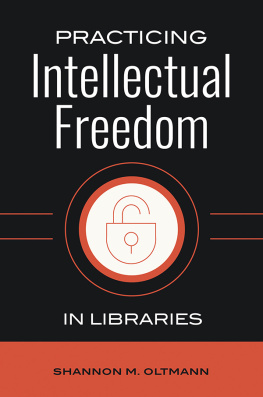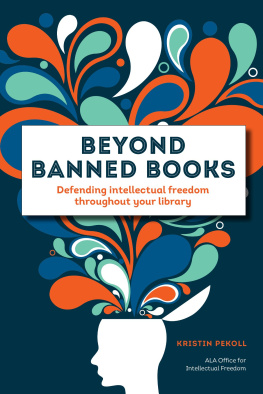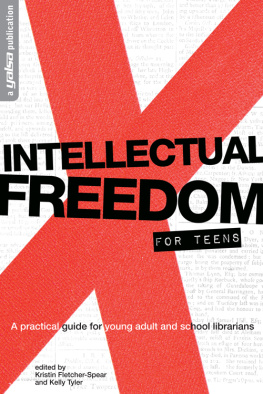Public Library Collections in the Balance
PUBLIC LIBRARY COLLECTIONS IN THE BALANCE
Censorship, Inclusivity, and Truth
Jennifer Downey
Foreword by James LaRue
Copyright 2017 Jennifer Downey
All rights reserved. No part of this publication may be reproduced, stored in a retrieval system, or transmitted, in any form or by any means, electronic, mechanical, photocopying, recording, or otherwise, except for the inclusion of brief quotations in a review, without prior permission in writing from the publisher.
Library of Congress Cataloging-in-Publication Data
Names: Downey, Jennifer, author.
Title: Public library collections in the balance : censorship, inclusivity, and truth / Jennifer Downey.
Description: Santa Barbara, California : Libraries Unlimited, an imprint of ABC-CLIO, LLC, [2017] | Includes bibliographical references and index.
Identifiers: LCCN 2017027252 (print) | LCCN 2017004285 (ebook) | ISBN 9781440849657 (ebook) | ISBN 9781440849640 (acid-free paper)
Subjects: LCSH: Public librariesCensorshipUnited States. | Public librariesCollection developmentUnited States. | Libraries and communityUnited States.
Classification: LCC Z711.4 (print) | LCC Z711.4 .D69 2017 (ebook) | DDC 025.2/13dc23
LC record available at https://lccn.loc.gov/2017027252
ISBN: 978-1-4408-4964-0
EISBN: 978-1-4408-4965-7
21 20 19 18 17 1 2 3 4 5
This book is also available as an eBook.
Libraries Unlimited
An Imprint of ABC-CLIO, LLC
ABC-CLIO, LLC
130 Cremona Drive, P.O. Box 1911
Santa Barbara, California 93116-1911
www.abc-clio.com
This book is printed on acid-free paper 
Manufactured in the United States of America
In memory of Wendy Summers Lewis-Rakova
Contents
Guide
In theory there is no difference between theory and practice; in practice there is.
Unknown, though often attributed to Yogi Berra
For many of us in the field, librarianship is less a job than a calling. There is a moment of recognition, an awareness that the profession speaks to our deepest internal values. Most often, that value is intellectual freedom. We have a fierce belief in the fundamental dignity of human inquiry. We believe that all human beings have both the right to express themselves and unfettered access to the expressions of others. We stand proudly against the forces of censorship.
Thats the theory.
In practice, things can sometimes be very different. As Jennifer Downey relays in the opening of her book, the collision between theory and practice can be as pointed and immediate as a reporter looking for a quote. Or, in the many realistic, uncomfortable vignettes at the end of each chapter, we may find that our values are not universally accepted, may falter, or have unintended consequences.
I suspect that American librarians are entering a time of new and greater challenge. On the one hand, we see a parenting style that has moved from helicopter to Velcrono longer hovering, now bound close to the offsprings skull, to and through high school Advanced Placement English classes. On the other, as witnessed by the 2016 presidential election, we see growing anger and fear about Islam, globalization, and diversity in all its manifestations. We are, at this writing, still a nation divided, which means that half our population is poised to take instant offense, even outrage, at virtually anything the other half says or does.
Collecting what everyone says or does, then letting people know they can come and get it, is pretty much the job description of librarianship. That puts us smack in the middle.
So Downeys book comes at just the right time, with just the right information and tone. The theory is here, with clear, succinct explanations. But the practice is here, too, provided with the same unflinching directness. For instance, library principles hold that young people have First Amendment rights, just like adults. Yet the majority of (adult) Americans disagree. The majority can be wrong, of course. But whether theyre wrong or not, its a potent recipe for conflict.
So what do we do in this fractious time?
Answer: be professional. Think it through. Own our values. Understand and adopt the best practices in the field. Maintain courtesy and respect to all. Know where you can find help when you need it, because you will.
Public Library Collections in the Balance exemplifies the balance we strive for. In this survey of some of the key issues and players now current in American librarianship, Downey finds genuine poise, a perspective that is neither too naive nor too cynical.
The work we do continues to be important. It continues, in fact, to be transformative both for individuals and our communities. This book is a handy guide, and a good reminder.
James LaRue
Director, Office for Intellectual Freedom
American Library Association
The patron called the reference desk in the late afternoon, all blustery tone and sharp manner, asking me to put the book Rabbit Is Rich , by John Updike, on hold for her to pick up later, but first, she had a question: Was the book housed in the childrens department or in adults? Its in adult fiction, I replied.
An hour later, there she was, having retrieved the book and handing me her business card. She was a reporter from a local news affiliate. A local 12-year-old girl, it seemed, had checked the book out from her middle schools library a few days earlier, seemingly not deterred by its more than 400 pages of dense text, including several sex scenes. The girl showed the book to her mother, who promptly contacted the local news station.
I wondered aloud why the reporter had come to the citys public library with a concern about a middle schools collection. It was late in the day, she explained, and the school had already closed. She wanted to get to the bottom of this right away so her piece could air the next morning, and that meant interviewing me on camera, right then and there, about how books containing adult content shouldnt be available to children. I refused, and she countered by asking if anyone would consent to an interview. Our director had gone home for the night. There was just myself and my coworker, Jessica, who quietly shook her head at the idea of an interview.
I tried to clarify our reticence. Were all about promoting access, not restricting it, I explained. Were not authorized to make reading decisions for other peoples children. As I kept speaking, I realized that there was an unspoken word hanging in the air between usa word I didnt want to use for fear of escalating the situation. I tried to stammer it out, but I knew it would upset the reporter, so I tried, and failed, to think of an acceptable synonym.
Censorship, said Jessica, calmly and clearly, without looking up from her papers. I breathed a sigh of relief, nodded, and then I said it, too, out loud: Cen-sorship. Why had I been so afraid to say it?
When the news story came out the next day, there were several clips of the reporter interviewing parents with young children about Rabbit Is Rich . Those who made it on the air expressed the correct combination of horror, shock, and disappointment. The clip was dramatic, outrage-provoking sensationalism, and much of it took place right under our public librarys sign, making it appear that we had agreed to such a thing. I was saddened and horrified but also glad Id said itthat loaded wordthe one Jessica said so coolly while I could not manage it. As I watched the news report, I wished Id had the courage to say it first, and I admired Jessica for her straightforwardness.

